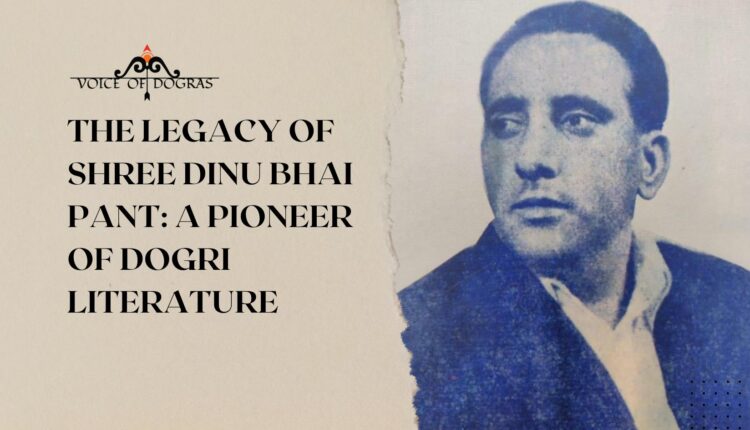Remembering Shree Dinu Bhai Pant ji in his birth month.
Shree Dinu Bhai Pant is regarded as one of the senior poets and playwrights of Dogri Literature in India.
He was born on the day of Baisakhi 1918 in the village Painthal. This village is situated near Katra in the foothills of Trikuta Hills (VAISHNO DEVI SHRINE) .
Shree Dinu Pant was unaffected by the rampant casteism and untouchability, religious obscurantism and the hollowness of superstitions and ritualism. The sensitive mind of Pantji was busy acquiring knowledge about practical behaviour from the environment around him. He was very progressive and far ahead of his times.
In the beginning Pantji composed witty and humorous poems. Not many knew at that time that in these satirical poems were present the seeds of an undeveloped genius. He had inherited the satirical trait from the environment of wit and repartee prevalent in his village.
Pantji had a painful realisation that the number of educated people who would come to listen to the literary creations in Jammu did not exceed fifty or a hundred. Why not try to start writing in Dogri the mother tongue of the region. As a result of this, Pantji wrote his famous long poem ‘Shehar Pahlo Pahl Gaye’ in 1943. This was followed by ‘Chache Duni Chand Da Behah’, ‘Lund Leader and some more poems.
Throughout his life, Pantji struggled, ideologically and practically, against tyranny and injustice. That is why in his popular poetry, he supported the common man. In Sarpanch, Data Ranu who sacrifices his life in order to support the right cause, has been made the central character. He wrote a poem and a “Khand Kavya’ on Mian Dido and Maharaja Gulab Singh respectively as the symbols of self-respect and freedom.
Shree Dinu Bhai Pant wrote a play called Sarpanch, based on the life of a folk hero, Data Ranpat. This play was later on staged many a times in different, far-off villages/towns.
The great success of the play ‘Sarpanch inspired Pantji to write, later on, a play ‘Ayodhaya’ based on Keikayi, the controversial character of the Ramayan. Pantji received an award from the Sahitya Akademi in 1985 for this play.
When a radio station at Jammu was set up in 1947. Pantji worked for sometime as a staff artist and later, as a casual script writer. In 1948 he was appointed the publicity officer in the Rehabilitation Department
This Department was playing a useful role in the rehabilitation of hundreds of thousands of refugees. He was made a Panchayat organiser in 1950. He was entrusted with many responsibilities in view of his intelligence and honesty. Because of his commitment, hard work and dedication, Pantji was promoted and became an officer in the senior cadre of the state. He retired in 1978 as Deputy Provincial Rehabilitation Officer.
Pantji was fully satisfied with his family life. His three sons and two daughters are well-settled. About his wife, he said that she had no complaint against him, because in her presence, he was a meek and docile husband. This statement is literally true. That is why, the revolutionary poet who called God a trap laid down by the thugs and fraudulent people and was a supporter of dialectical materialism, remained not only a passive spectator when his wife arranged a special ritual for his well-being on 23rd March, 1992 but participated in it so that the sentiments of the members of his family were not hurt and their faith remained intact. At about twelve noon, when half the ceremony was over, the Pandit told him that he could take tea or something. Pantji started taking tea in the company of his son, Manoj, and his sister Rama. During tea, he started narrating how in his youth there used to be held special rituals in Painthal in order to propitiate the gods and how the people were roaming in the magical world of reminiscences. Suddenly, his cup of tea slipped from his hands. He became unconscious. This was the third and very major heart attack. He became conscious and remained in that state for about half an hour, but became unconscious again.
Destiny was driving him relentlessly to that state which he had called the state of blankness or vacuity during his first heart attack.
At that time he had observed that the immortal human drinks nectar while sitting in the lap of death, and colours life with laughter and happiness. He passes on the light of life in the form of beatings of the human heart, from one generation to another.
Man is his own God:
If Death is a mere illusion,
Why should then man fear death?
Without coming into conflict with the traditional beliefs of his wife in anyway, he remained firmly steadfast in his beliefs. When the news of his death came, there were tears in the eyes of thousands of his readers, admirers and friends. Many people were reminded of his words:
“How does it matter if we stop breathing tomorrow?
Our life will still continue.
The new shapes and forms of next generations Will testify that they are an extension of us, and we live through them.”
It appears Pantji had pondered deeply on the mystery of death. While expressing his personal feelings and experiences, he wrote on 7th October, 1990..
“Carrying the load of uneven and untested traditions, stumbling and falling, with failing breath, I am crawling on the path that leads to death.
In this poem, he seemed to be coming face to face with the reality of life against the background of the world. He considered death to be a natural process of life, and an inevitable and unavoidable law of nature. In another poem, he spoke to Hope in this way:
“Hope, you are a fragile chords, A divine light of love; You are the motivating force Of this pleasing and beautiful creation.
Source – Book By Sh. Om Goswami (Dinu Bhai Pant) , Translated by Sh. Nilamber Dev Sharma
Arranged by – Dhruv Pant (Grandson)


Comments are closed.